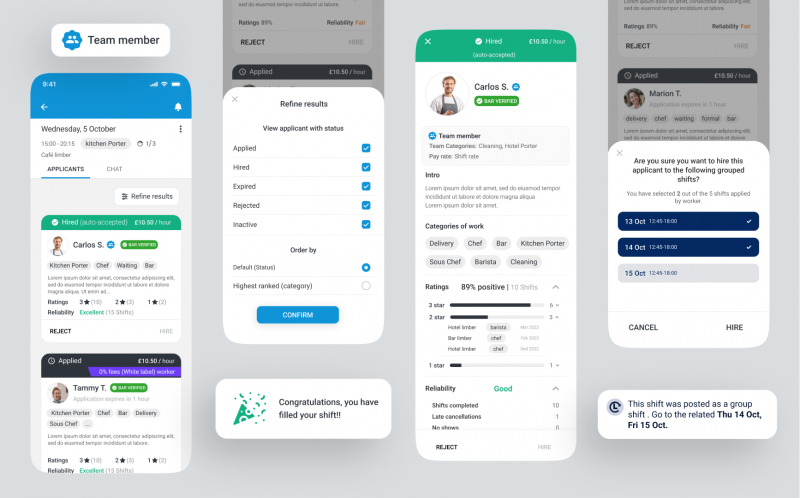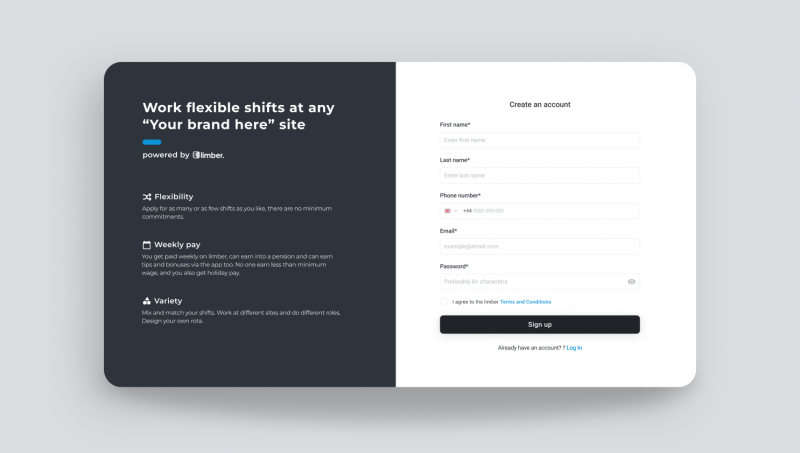Last week limber CEO and founder Chris was invited to speak at the Tech Future’s Forum at London’s Sea Container, hosted by City law firm RPC. Find out what happened when he was grilled about the shift towards flexible working and the integral part that technology has to play in the way we now choose to make money.
Q: Chris, can you start by telling us a little bit more limber and what drove you to found it?
A: I started a business, and this sounds awful to admit, but mainly because I was bored. A little bit bored of law. A little bit bored of doing one thing. Bored of going to the same place every day to work for the same business. I felt I had more to give. I wanted to use my skills and personality in different ways each week.
So it’s funny really that the business I started was all about giving people an alternative to the “job” or the “career” or the traditional way of viewing things. Our first product gave people total flexibility and variety in hospitality – they could work one day as a chef, then do some barista shifts then make some cocktails, it was essentially a way of combining 4 or 5 jobs at once.
Our second product however, goes way beyond hospitality. It helps champion the modern day slashie. So now rather than a barista / chef. It’s all about the barista / mechanic / accountant. You can do (almost) anything you want.
Q: You’re obviously benefiting from, or inciting a change in the workforce, and the way people see their careers. Can you explain that a little more?
A: I’m not really sure about tech products inciting change. Put it this way, we don’t get to sit in front of investors and tell them we’re changing the world, we just get to say a shift is happening, and we’re going to be a big part of the conversation. Anyone who thinks they’re going to change their user’s mindset, doesn’t really understand users.
But anyway, if you look at how our grandparents worked, they had one, maybe two jobs for their entire lives. Studies suggest that between the 80’s and 00’s job hopping tripled and now self employment is at an all time high, the gig economy has boomed. The shift towards a new way of working is clear, we’re all faced with so much more choice. You can earn a quick buck in the gig economy and going solo is easier than ever. There’s never been so many viable alternatives to the traditional work mode which I think some people find worrying. Personally, I find it massively exciting.
Q: Some might argue that the gig economy makes sense for certain industries – taxi drivers and hospitality workers. But what’s the limit? Can and should my children still have “traditional careers” if they want them?
A: You’re right. So far, there have been some limits. If we wind forward however, I see a far more open way of working and hiring. If you were going to design a system for working from scratch for today, I think it’s seriously unlikely that you’d have employment contracts, notice periods, job titles. It’s too prescriptive. Why can’t sobe an accountant and a graphic designer? Our obsession in specialising is very one dimensional and dare I say outdated.
As for the younger generation, there’s a few ways of looking at it. If they want to specialise and do one thing (I hope many people do) the model doesn’t prevent that. It may just be that you’re a specialist engineer that works across 4 sectors, 3 countries and 20 companies each year – surely that’s a more efficient and desirable way of distributing talent? For those people who don’t want to specialise, the chances are, the work they do in their 20s won’t exist in their 40s, so there’s no harm in getting used to adapting and learning new skills.
Q: I had the benefit of reading a thought piece you wrote on the future of work. You say ‘it’s insane to specialise, frightening and not very mindful or healthy to continually chase towards something’. But isn’t freelancing on an app the most anxiety inducing choice of all? What about the social bonds we gain through working in a company and the (perhaps illusory) sense of security and belonging?
A: Those are important questions. As someone who didn’t want a career, I’d say that staring down the barrel of a 50 year career caused me way more angst than the 18 months I spent without a salary – I don’t recall ever being anxious and if I was, then it was far outweighed by the excitement of taking my own path. But you’re right, for some it will be worrying and that’s why our second product IS designed to be more supportive, we want people to be able to feel as secure as possible in what they’re doing.
The social bonds are interesting. Lots of companies like to make a big thing of their “culture”. It’s a huge recruitment and BD tool. I’m a bit cynical about that, I don’t think you need an employment contract to be able to create bonds with the people you work with.
Q: So, the gig economy and the zero-hours model (such as uber) has attracted a lot of criticism. How does your world differ from this?
A: It’s a minefield. Uber and Deliveroo’s court cases are good examples of the right practical outcome, but it seemed like a bit of a legal “hack” to me – not that I’m an expert. People should be protected, no matter how they work and to classify someone as self employed just to get round some regulations isn’t right. The regulations haven’t moved on and simply don’t reflect the growing reality out there.
For what it’s worth, limber ensures that everyone gets at least minimum wage, holiday pay, pension and our new product is going to give slashies around the world the chance to earn equity in limber. It’s a co-operative and so, we’re all in it together – as the community grows, so will the value of individual equity. Initiatives like that are a good example of what needs to change for people to legitimately and sustainably work in a more flexible, more liquid way. But I accept we’ve got a way to go.
Q: Finally, what advice regarding the future of tech and the workforce would you give for those who find it daunting?
A: In theory, there’s nothing anyone can do about it, so try to embrace it! I think that flexible working, remote working, working from home, are all sticking plasters over a much more fundamental problem. I actually think it’s more about being open minded and letting people openly think about their other interests. Either find a place in your organisation for them to do it, or get out of the way and let them find variety elsewhere. Maybe it’s about letting go a bit to retain your talent.




